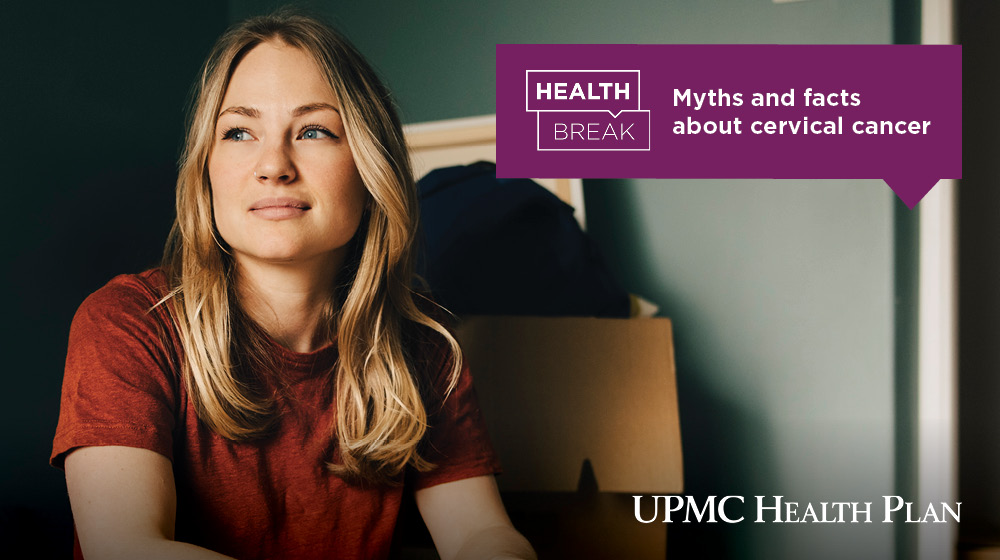Health Break: Myths and facts about cervical cancer

A podcast for UPMC Health Plan members, Health Break is your quick guide to caring for your mental and physical health, prioritizing wellness, and making the most of your health insurance plan.
Episode 23: Take a Health Break with Dr. Nick DeGregorio
Dr. DeGregorio takes a Health Break to bust common myths about cervical cancer and share tips for screening and prevention.
Episode transcript:
Camille: Welcome to Health Break by UPMC Health Plan, your quick guide to health, wellness, and how to make the most of your health insurance plan. I’m your host, Dr. Camille Clarke-Smith. I help to oversee the quality of the plans and programs we offer at UPMC Health Plan.
Angelo: And I’m your co-host, Angelo Bartic. I’m a health coach who works with our members on making healthy lifestyle habits and setting goals. This is your…Health Break.
Camille: Hey everyone, Dr. Camille Clarke-Smith here, and today we’ll be talking myths and facts about cervical cancer with Dr. Nick DeGregorio. Plus, we’ll learn steps you should take to help prevent cervical cancer.
Thank you so much, Dr. Nick, for being with us today. Can you tell us—what is cervical cancer, and what are some of the symptoms?
Dr. DeGregorio: Cervical cancer is a gynecological cancer that starts on the cervix, and that’s the lower part of the uterus that connects to the vagina. Most cervical cancer is caused by certain strains of a virus called human papilloma virus, or HPV—particularly strains 16 and 18 can cause cancer. HPV is transmitted through sexual intercourse. It infects the cells in the cervix, but can remain asymptomatic for a long period of time. And by asymptomatic, I mean the virus is present and it’s causing slow changes in those cells, causing them to become diseased—but the person has no symptoms at all during that period of time. Over time, that virus can cause changes in the DNA of the cells in that cervix and can cause them to become cancerous. Cervical cancer, again, can develop and be present for a long time before symptoms appear.
And once those symptoms appear, they can take the form of a vaginal discharge, vaginal bleeding, that can include vaginal bleeding after intercourse. It can cause pelvic pain or pain during sex.
Two key points about the prevention and early detection of cervical cancer are: One, it can be prevented with an HPV vaccine, and it can be detected early, treated, and cured with routine cervical cancer screening. And when caught early, it actually can be cured with a very minor procedure. If it’s detected in a more advanced stage, then it might require more invasive surgery or other type of treatment with medications.
Camille: So it sounds like there’s actually a lot to know about cervical cancer. What are some of the myths about cervical cancer that you’d like to debunk with us today?
Dr. DeGregorio: Yeah, and I think some of these myths come from what you hear from patients over the years. One is that they feel they don’t need to be screened because it doesn’t run in their family. Again, important to recognize cervical cancer isn’t a familial disease. It’s primarily caused by that HPV virus, as well as other risk factors such as smoking. Another that we hear frequently is they don’t need to be screened because they don’t have symptoms. And as we said earlier, you can have the infection and the virus that’s causing those changes in the cells over many years before you actually develop symptoms. And lastly, some people feel they don’t need to be screened because if they have cervical cancer, it can’t be treated. And as we said, the earlier you detect it, the easier it is to treat it and cure it. So it’s a very treatable and preventable condition.
Camille: When we talk about screening, can you tell us about preventative measures we can take against cervical cancer?
Dr. DeGregorio: Yeah, I think first and foremost is getting preventive screening, getting testing to identify those pre-cancerous [cells] before they turn into more invasive forms of cancer. And that’s typically done through a cervical cancer screening when you have a pelvic exam with your gynecologist or your family doctor.
Camille: How often should we be getting tested? Are there different types of tests and how do you know which one is right?
Dr. DeGregorio: Yeah, there are a couple different types of tests that can be used alone or in combination. You know, first cervical cancer screening can be obtained by getting a sample of the cells from the cervix during a pelvic examination. The cells are then tested under the microscope to see if there are any pre-cancerous or cancerous changes. And secondly, they can be tested for the presence of that human papilloma virus or HPV to identify if there’s that additional higher risk for developing cervical cancer from the viral infection. It’s really recommended that screening begin at age 21, and from ages 21 to 29 the recommendation is just to have the cervical Pap test or the cervical cytology screening every three years. Then starting at age 30 and going from ages 30 to 65 years old screenings are recommended every three years with that cervical cytology, the Pap test alone, or every five years using the cervical cytology and the HPV testing.
Camille: We’ve talked a lot about HPV. How can we minimize risk of exposure to HPV?
Dr. DeGregorio: I think first and foremost, it’s important to recognize that HPV is a really prevalent infection. So many, many people get it. Some it will clear spontaneously, and they’ll overcome the virus—but in many it develops that chronic infection. So first and foremost is prevention and that occurs with the HPV vaccination. That can actually prevent the virus from infecting the cells and being able to cause changes resulting in cervical cancer. So the HPV vaccine is recommended as a routine immunization now at ages 11 and 12, and can be given as early as 9 years old. It’s recommended for adults up to age 26 if they were not previously immunized, and it’s recommended in some adults ages 27 to 45 if they’re particularly at high risk after discussion with their doctor.
Camille: Thank you so much, Dr. Nick, for taking a Health Break with us today and talking myths and facts about cervical cancer.
Dr. DeGregorio: Thank you.
Camille: Talk to your ob-gyn or primary care provider about when you should get a cervical cancer screening.
Find show notes and more information at upmchealthplan.com/podcast. Join us as we continue exploring health, wellness, and how to make the most of your health insurance plan in the next episode of Health Break.
This podcast is for informational and educational purposes. It is not medical care or advice. Individuals in need of medical care should consult their personal care provider. Views and opinions expressed by the hosts and guests are solely their own and do not necessarily reflect those of UPMC Health Plan and its employees.
Related to this episode:
- Learn more about cervical cancer preventive screenings.
- If you are a UPMC Health Plan member and you want help quitting smoking or making other healthy lifestyle changes, connect with an expert health coach.
About Dr. Nick DeGregorio:
Dr. Nicholas DeGregorio is an internal medicine physician currently serving as the senior medical director for UPMC for You. Dr. DeGregorio completed his medical school training at the University of Cincinnati School of Medicine, an Internal Medicine Internship and Residency program at the University of Pittsburgh, and a Master of Medical Management degree from Carnegie Mellon University. Additional areas of interest and support he provides at UPMC Health Plan include provider credentialing, quality improvement, patient-centered medical home, value-based reimbursement, opioid use disorder, overdose prevention, opioid use disorder in pregnancy, neonatal abstinence syndrome, and women’s health.
About Dr. Camille Clarke-Smith:

Camille Clarke-Smith, EdD, is a program director in the Quality Improvement, Medicare Stars Department at UPMC Health Plan, where she leads the Medicare Faith and Wellness Program, a 3- to 12-week health and wellness challenge. She is also the founder of the nonprofit Transforming the Health of African American Women (THAW) Inc. She earned a doctorate in health and physical activity education from the University of Pittsburgh in addition to a master’s in exercise science and a bachelor’s in psychology and sociology. She is currently pursuing her master’s degree in social work at Carlow University.




